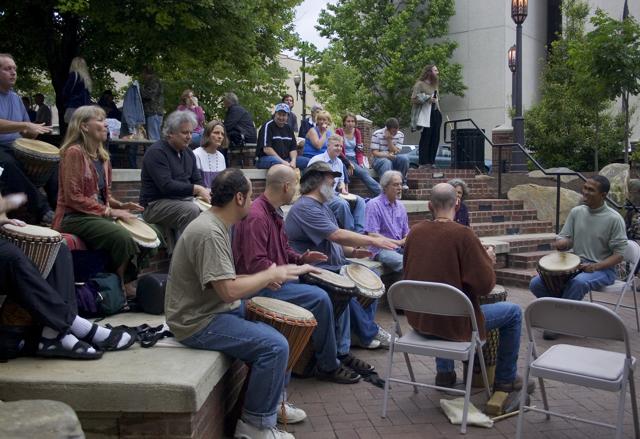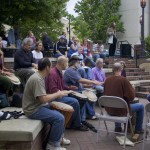- Drum all about it: Twenty-seven years ago, some observers dubbed downtown Asheville a virtual ghost town; today, it’s the scene of regular events — like the weekly drum circle — and a thriving mix of shops, restaurants and businesses. photo by Jonathan Welch
- Ghosts of Asheville past: By the late 1970s, more than three-quarters of downtown Asheville’s buildings were boarded up and vacant, as many businesses flocked to the new mall on Tunnel Road. photos courtesy Karen Tessier
- Group effort: Over the years, more than 150 residents, business owners, city and county staff, and civic leaders have planned and followed through on the revitalization of downtown Asheville.
Thirty years ago, three-quarters of downtown Asheville’s buildings stood empty, and “the minimal stirrings of street life and foot traffic included not one but two red-light districts.” So says a 2006 report titled “Public Leadership of Asheville’s Downtown Revitalization,” which appeared in Popular Government, a publication of the UNC School of Government.
“We used to say, ‘You could shoot a rifle down the street any night, and you wouldn’t hit a thing,’” the report quotes former Asheville Mayor Lou Bissette as saying.
Downtown Asheville “was a ghost town, [and] its comeback is a long story,” notes co-author Leslie Anderson. She should know. From 1986 to 1995 — a time of dramatic change in Asheville’s central business district — Anderson was the city’s downtown development director. And to honor her role in the revitalization effort, she’s been named a “downtown hero” by the Asheville Downtown Association, which is hosting a two-day conference and celebration Feb. 27-28 (see sidebar, “A hero’s welcome”).
Celebrating downtown means telling its story and having the pioneering business owners who lived through those times pass on their knowledge, says Joe Minicozzi, the ADA’s executive director. The nonprofit association held its first meeting in 1987.
Both Anderson and Minicozzi are quick to emphasize that reviving Asheville’s moribund downtown required the work and commitment of many people, from city and county staffers to volunteers like Grace Pless and philanthropists like Roger McGuire and Julian Price.
As Anderson and co-authors Anita Brown-Graham and Jennifer Lobenhofer wrote in 2006, by the mid-’70s, department stores and other retailers had “migrated to the Asheville Mall,” which opened in 1973. “Downtown had hit rock bottom,” the report concludes, and despite the 1977 creation of an Asheville Revitalization Commission, there wasn’t much public support for turning things around.
The catalyst came a few years later, when a developer proposed razing 11 downtown blocks and turning the area into a mall. The plan called for the city to issue $40 million worth of bonds, and after months of contentious debate and a public demonstration around the proposed site, the idea was voted down by a 2-1 margin.
“That saved downtown from being destroyed and solidified preservation efforts in the community,” Anderson recalls. “It set us on a path” based on public/private partnerships, she adds, which produced ambitious anchor projects such as Pack Place and renovated historic structures like the YMI Cultural Center on Eagle Street.
By 2006, the central business district had morphed into a place “where you can drink a cappuccino at a sidewalk café, browse through antique shops or join an impromptu bluegrass jam.” Asheville, ranked among the “Top 10 Places to Live” by Outside magazine, had reclaimed its moniker: the Paris of the South.
A vastly different landscape
The turnaround wouldn’t have happened without downtown heroes, Minicozzi maintains. He’s working on a spreadsheet that charts the contributions of more than 150 people who helped transform downtown, such as Tops for Shoes co-owner Bob Carr, whose in-laws launched the business as a general store in 1952 and never left downtown.
Carr, the ADA’s first president, is one of many residents, business owners and civic leaders who made Asheville’s revitalization possible. Some are well-known, some not: Jan Davis, Joe Eckert, Harry Weiss, Roger McGuire’s wife, Pat, Barbara Field, Stephanie Twitty, Susan Roderick … just to name a few.
Both Anderson and Tops for Shoes are being honored during the ADA’s Downtown Small Business Conference and Celebration. The third downtown “hero” to be feted is Public Interest Projects, the development company started by Julian Price.
“Without these and others like them, the downtown landscape would be vastly different,” current ADA President Byron Greiner points out.
The two-day event includes a series of workshops, the annual State of Downtown Luncheon and an awards party.
“These people made it all happen,” Minicozzi says about the names on his spreadsheet. Determined city residents, he mentions, “took six years to get trees and sidewalks … going way back to the 1980s, and many of these people are still here.”
This is also the first time the annual event will feature a small-business segment, including Carr’s talk about “Surviving Tough Times.”
“The conference celebrates those who’ve been here and gives them a chance to pass on the knowledge about what it takes to succeed in business,” Minicozzi notes.
In other words, Asheville’s downtown heroes just keep giving back.
— Margaret Williams can be reached at 251-1333, ext. 152, or at mvwilliams@mountainx.com.






Before you comment
The comments section is here to provide a platform for civil dialogue on the issues we face together as a local community. Xpress is committed to offering this platform for all voices, but when the tone of the discussion gets nasty or strays off topic, we believe many people choose not to participate. Xpress editors are determined to moderate comments to ensure a constructive interchange is maintained. All comments judged not to be in keeping with the spirit of civil discourse will be removed and repeat violators will be banned. See here for our terms of service. Thank you for being part of this effort to promote respectful discussion.